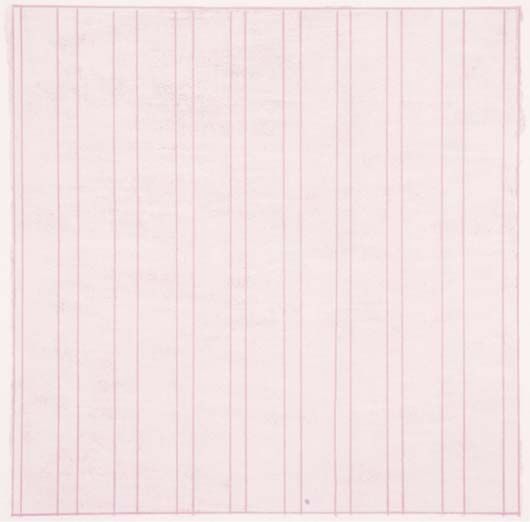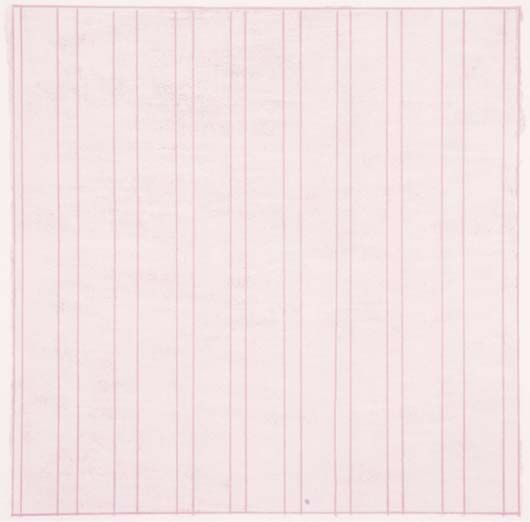Agnes Martin, "Praise"
It is a pink square with a texture like a paper napkin.

On E-sports
I play League of Legends. It's a competitive video game, an "e-sport." The product has always been far from perfect, but it is especially frustrating now. At the lower ranks of competitive play, there are "bots," scripts that act as other players in order to play games for the sake of leveling up accounts. I realize that doesn't sound like English to some of you, so I'll put it another way. You get into a game and one or two of the players on your team aren't human. They will use abilities randomly and maybe disconnect in the middle of a fight. By contrast, I play League of Legends because of anticipation and precise teamwork. For example, when your teammate uses a stun to lock an enemy in place, your job is to use your abilities in combination, do damage, and then prepare a retreat or pursuit.
"Bots" might not even be the worst part of the experience. You are placed into teams by an algorithm, and the algorithm does seem like it is designed to find the worst of the playerbase and put them on your team. There are massive incentives for a company to do this, especially if a player is willing to play through losses. Why not maximize their time on site by continually tempting them? It makes sense to exploit players by matching them up with teammates who cannot possibly win a game. An algorithm can easily detect when another player is winning only because the other team has internet problems or has a "bot" on their team.
In any case, Ryan Broderick mentioned in Garbage Day that maybe the whole of "e-sports" is "teetering." Here's his musing on the topic:
...The New York Times had a big piece out this weekend that described the overall e-sports industry as “teetering”. Viewership is down, stocks are down, and FaZe isn’t the only operation announcing layoffs.
I’m going to harness all of my sports media knowledge at once here to try and give you some coherent analysis. I think there are two ways to look at this contradiction — that e-sports is still huge on streaming platforms, but tanking as an industry. It could be that e-sports is like wrestling in the 90s and it’s just a matter of time until it finds its own Vince McMahon (gamer Vince McMahon is a truly terrifying thought). Or, perhaps, e-sports leagues will end up like FIFA, the Premier League, or Formula One, and catch on huge internationally and leave America behind.
He's being sarcastic about his "sports media" knowledge, but while this is a take I disagree with, it's a take worth engaging. What Broderick does so well in Garbage Day is identify what people are getting out of online culture. The quote above, however, does not really aim at what e-sports are. From what I can see, e-sports have at least two major aspects we must address. On the one hand, there's the "loot boxes" and gambling aspect of it, which extends all the way to cheating in pro-play. The same logic that has people try to win 5 games in a row for a cool new color for their character extends to professional players in cheating scandals. The industry's profit model cannot be divorced from online gambling.
On the other hand, there's a culture of streamers and tutors and creators separable from trying to steal all the money and time gamers have. People ask me why their kids are so into video games. I'm tempted to show them a good YouTube video of someone beating a boss. Typically, a kid is looking at someone closer to their age showing them value in an item they thought was trash. They're taking the thing they didn't find a use for and turning it into an incredibly powerful weapon. So here you are, learning from someone you relate to how to do things that have immediate impact in your game. You're learning that the things you were ignoring actually have tremendous potential. The streamers who are good at League continually show how to do more with less: how to make sense out of numbers which aren't always explained, how to bait people into bad situations, how to win a game with the items that aren't terribly fancy. People are getting out of gaming something akin to education. There are high-school and college e-sports teams everywhere, and they're worth joining for the sake of practicing how to analyze a situation and work with a team.
Maybe e-sports finds a "Vince McMahon," as Broderick says above, but I find it to be a weirder experience than that. The streamers and the industry itself can be separated—I'm certainly doing quite a bit with that—but I don't know that addresses what e-sports actually are in our culture and why they might or might not last.
Agnes Martin, Praise
It is a pink square with a texture like a paper napkin. The edges are rough, uneven. Darker lines, somewhat evenly spread, run from top to bottom.
Agnes Martin's Praise, a product of a stamp, feels like praise. I should know. I've gotten lots of compliments, well-wishes, and endorsements recently. I will treasure them: I have testimony I've done something right. But the ethereal quality of Martin's work makes me wonder what exactly I'm feeling. Or what I'm supposed to feel. Have I been transported to a wholly pink realm? Am I floating or bounded by that color?
Praise, Agnes Martin, 1976 pic.twitter.com/YmundcKimp
— A.V. Marraccini (@saintsoftness) May 14, 2023
Praise is not necessarily a good. For the ancients, the noble and the good were distinguishable. For example, self-sacrifice made you noble, worthy of praise. But strictly speaking, you received the praise in place of what was actually good for you. You would have been healthier, wealthier, or more powerful instead of being sung. The classical formulation points to another problem we're familiar with: What about those who have everything and still demand reverence? They are truly tyrants. The trouble is that those who are virtuous should receive goods and praises, but if that ever happens, virtue becomes conflated with tyranny.

There isn't "virtue" or "tyranny" in Martin's stamp. There is a lot of pink, one color only, cloudy and omnipresent. It suggests feelings. I should feel comfortable, secure, and joyful. Why am I anxious, then? Why do the vertical lines remind me of both musical and prison bars?
This is not the ancient world. I am in the United States in 2023. I need honor, I need praise, in order to secure the most basic livelihood. Late capitalism viciously targets labor, forcing us to fight for survival in a job market designed to be hell. I need people to say "this guy does exceptional work" to merit any consideration. It is strange to ponder how ephemeral and how necessary this pink square is.
For more on Agnes Martin: Holland Cotter's review of her corpus is an excellent read; Olivia Laing's essay is also excellent
